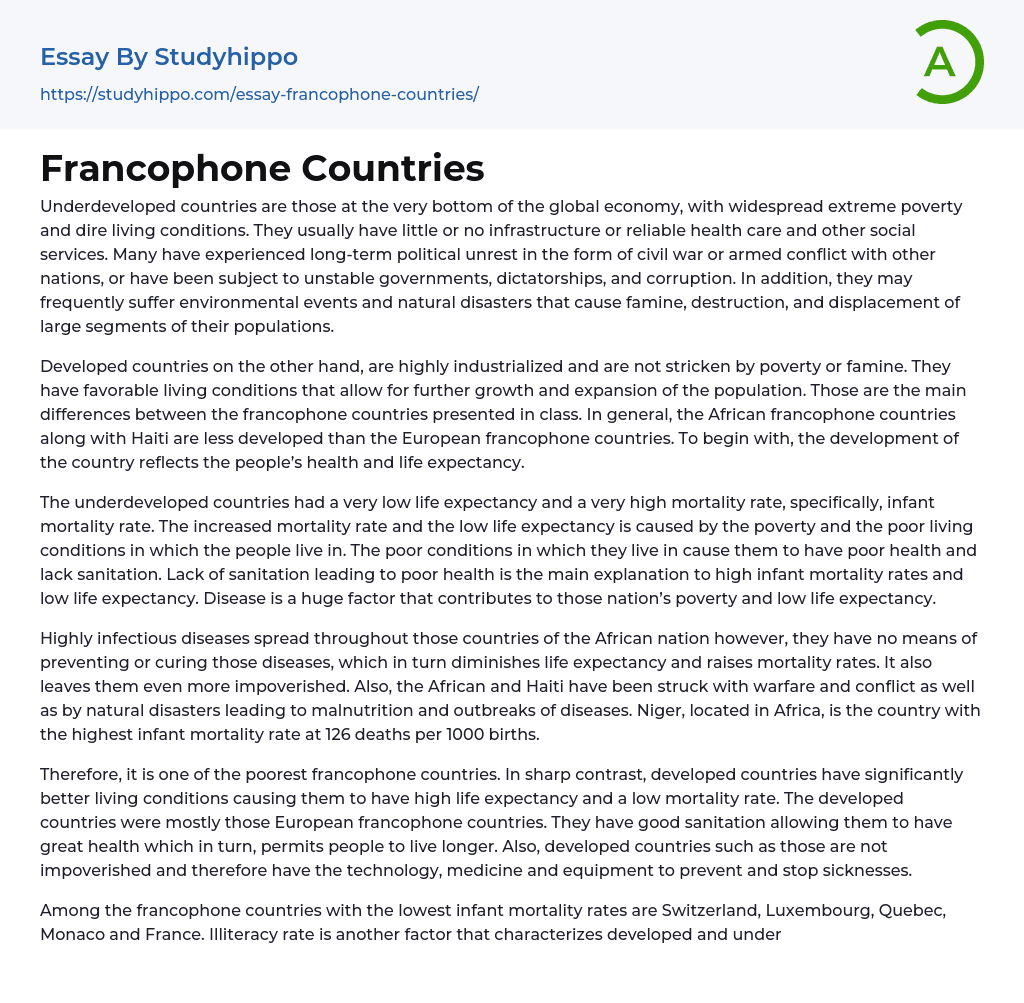Countries that are underdeveloped sit at the lower end of the global economy scale characterized by prevalent severe poverty and harsh living conditions. Infrastructure, reliable health care, and other social services are often scarce or non-existent. Political instability, which manifests as long-standing civil wars or armed clashes with other countries, dictatorships, and corruption are common traits of these countries. They are also frequently victims of environmental incidents and natural disasters leading to starvation, devastation, and relocation of large swathes of their populace.
On the contrary, developed nations are heavily industrialized and are not affected by poverty or lack of food. They possess conducive living conditions that promote continual growth and proliferation of the population. These elements primarily distinguish the Francophone nations discussed in the class. Broadly speaking, the Francophone nations of Africa and Haiti are less thriving compa
...red to their European counterparts. Initially, a country's advancement is indicative of its inhabitants' health and lifespan.
The insufficiently developed nations experienced a notably small lifespan and a particularly large death rate, particularly in the context of infant mortality. This amplified death rate and reduced lifespan are effects of their impoverished state and substandard living conditions. The harsh circumstances they face result in weakened health and insufficient sanitation. The absence of cleanliness, resulting in bad health, is the primary reason for elevated rates of infant mortality and reduced life expectancy. Illnesses play a substantial role in worsening these country's poverty and shortening life expectancy.
The countries in Africa and Haiti are heavily impacted by contagious diseases, which they lack the ability to prevent or heal. This not only increases death rates and reduces life expectancy but also worsens their poverty. Additionally,
they have had to struggle with wars, conflicts, and natural disasters resulting in malnutrition and disease outbreaks. Among these African nations, Niger reports the highest rate of infant mortality with a staggering 126 deaths per 1000 births.
Hence, it is classified as one of the most impoverished Francophone nations. Conversely, developed countries witness considerably improved living conditions which lead to increased life expectancy and decreased mortality rate. A significant number of these progressive nations are French-speaking European states. Their exceptional sanitation habits contribute to their superior health condition, enabling their inhabitants to enjoy longer lives. Moreover, due to the absence of severe poverty in these countries, they possess access to necessary technology, medicines, and infrastructure required for disease control and elimination.
In nations where French is the predominant language, like Switzerland, Luxembourg, Quebec, Monaco and France, there are notably low levels of child mortality. Another critical measure of a country's level of development is its rate of illiteracy. Generally speaking, countries that are less developed tend to have higher illiteracy rates compared to more advanced nations which usually exhibit lower rates. Countries suffering from extreme poverty often prioritize food production over education because malnutrition exacerbates the problem of rising illiteracy levels.
In less developed countries, work that requires a lot of labor is often prioritized to maintain livelihoods, making education out of reach and too expensive. This greatly influences the scarcity of educational opportunities in these regions as people put their family's survival first. Take for example Niger, regularly mentioned as one of Africa's most impoverished nations, it has an 80% illiteracy rate which symbolizes this pattern. Similar high illiteracy rates are prevalent in other African nations such
as Mali, Burkina Faso, and Benin.
In industrialized nations, the rates of illiteracy are typically low due to their high standard of living which facilitates easier access to schooling. Citizens of these countries can cater not only for basic needs like food and family income but also have sufficient financial stability to pursue education. In such societies, parents can comfortably meet the costs associated with their children's schooling. Additionally, as industries grow in these nations, there is an increased need for skilled professionals in the service sector, inspiring people to acquire literacy and education.
Switzerland and Luxembourg top the list of countries with the lowest illiteracy rates, proudly having a 0% rate. Belgium, Quebec, and France also compete closely. However, it's observed that French-speaking African nations and Haiti are not as developed compared to European nations where French is predominantly spoken. Unfortunately, the living standards in these underdeveloped regions do not measure up to those in more progressive countries which have considerably better living standards.
- Pregnancy essays
- Death essays
- Asthma essays
- Chronic Pain essays
- Diabetes essays
- Infection essays
- Infertility essays
- Pain essays
- Sexually Transmitted Disease essays
- Cholesterol essays
- Epidemic essays
- Pathogen essays
- Symptom essays
- Water supply essays
- Myocardial Infarction essays
- Chronic essays
- Hypertension essays
- Black Death essays
- Breast Cancer essays
- Down Syndrome essays
- Apoptosis essays
- Tuskegee Syphilis Experiment essays
- Type 2 Diabetes essays
- Fun Home essays
- The Raven essays
- Overpopulation essays
- Homelessness essays
- Hunger essays
- Dumpster Diving essays
- Homelessness In America essays
- Culture essays
- Social Control essays
- Citizenship essays
- Social Justice essays
- Caste System essays
- Social Responsibility essays
- Socialization essays
- Deviance essays
- Modern Society essays
- Popularity essays
- Civil Society essays
- Community essays
- Female essays
- Filipino People essays
- Igbo People essays
- Indigenous Australians essays
- Indigenous Peoples essays
- Minority Group essays
- Social Institution essays
- Men essays




